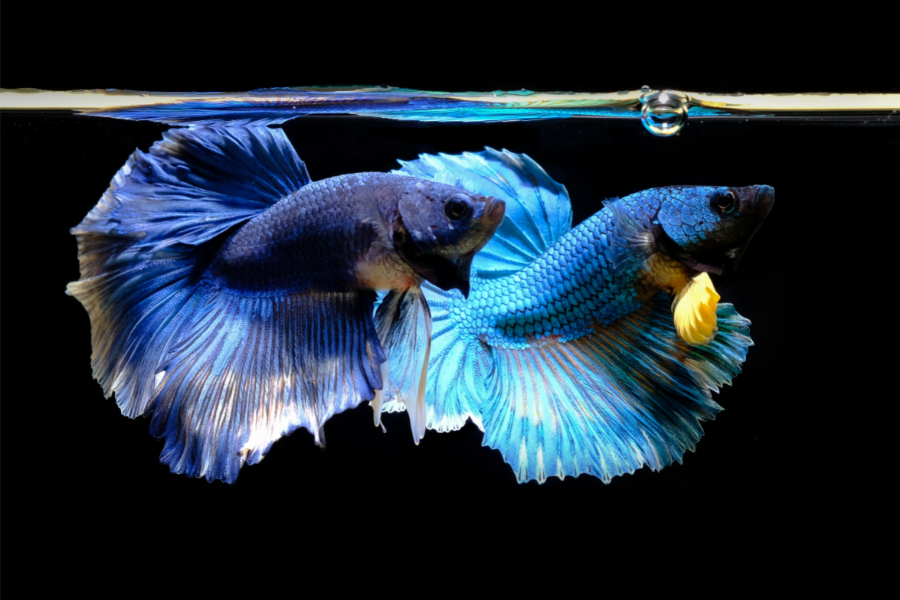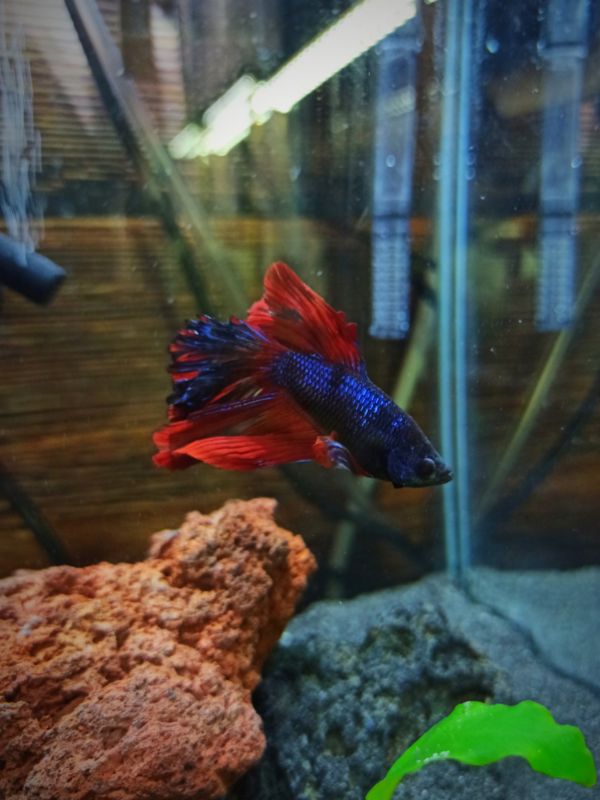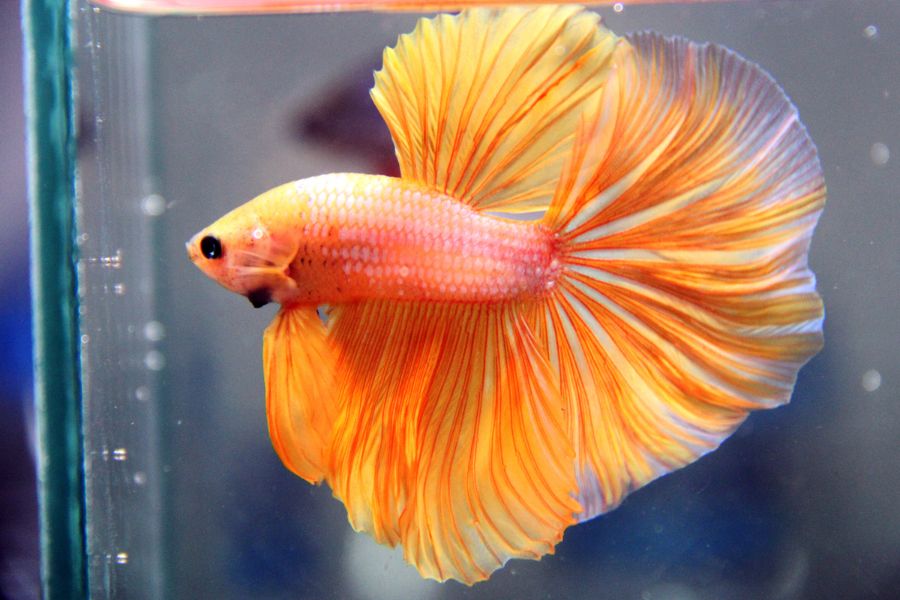Betta fish are some of the most colorful, vibrant, and interesting fish that can be kept in an aquarium.
They are an incredibly popular fish because of their beauty and ease of care. However, beginners to the hobby may require guidance during their initial stages of caretaking.
One of the questions that often gets asked is whether or not Betta fish can live in tap water. After all, it’s easy to prepare tap water for setting up a Betta aquarium – but is it healthy for your Bettas?
This article will explore this question and provide all the information you need about Betta fish and tap water!
Can You Use Tap Water for Betta Fish?
The short answer is yes, Betta fish can live in tap water – provided that it’s appropriately treated.
While your Betta is unlikely to suffer from serious health issues directly from the tap water, it’s important to make sure that any potential toxins and contaminants are removed.
Untreated tap water contains many minerals and chemicals that can negatively affect the water quality, such as copper, lead, and nitrate.
Most people think that just because Betta fish can survive without a filter and breathe surface air means they can thrive in any water quality, but this isn’t true.
Betta fish belong to a subfamily of fish called anabantoids, also called labyrinth fishes. This kind of fish is unique because they have a “labyrinth organ” that allows them to get oxygen from surface air.
Because of this, they’re able to withstand poor water conditions for short periods of time.
If you want to use tap water for an extended period, you need to treat or condition it first. Conditioning tap water involves removing chlorine, chloramines, and other contaminants.
Tap water conditioning can be done by manual methods or by adding a water conditioner that will render other chemicals harmless.
Once the water is treated, it can be used to fill a fish tank and create a safe environment for Betta fish. Make sure you treat your water every time you do a water change, which is essential for Betta fish health.
Can Betta Fish Live in Tap Water Overnight?
It’s not recommended to leave Betta fish in tap water overnight outside of emergency situations. Emergencies include your tank breaking all of a sudden or someone suddenly dropping off a Betta fish at your place without prior announcement.
In both cases, you may not have supplies on hand, such as a water conditioner.
If you can avoid it, though, it’s best to not leave Betta fish in tap water overnight. While it’s true that they can typically survive 24 hours in poor conditions, it’s still not good practice.
Plus, Bettas are sensitive creatures and can become ill if exposed to contaminated water, which tap water often contains.
To be sure, avoid leaving Betta fish in tap water overnight and instead use conditioned or treated water.
How Long Can a Betta Fish Live In Tap Water
Betta fish can’t tolerate untreated tap water for a long period.
In fact, it’s not recommended to leave them in tap water at all. It might not kill them immediately, but the chemicals in the water can damage their body as soon as it comes into contact.
The water needs to be conditioned with an aquarium water conditioner before use to remove harmful contaminants, and only then can it be suitable for your Betta to live in.
But if you want your Betta to live in that water for long periods, just conditioned tap water isn’t enough.
You also need to implement a regular water change schedule to ensure the Betta fish have clean, fresh water at all times.
This is because, besides tap water contaminants, your Betta – along with other tankmates like shrimps or snails – will also produce waste that will pollute it over time.
It might seem like a lot of work, but with proper care and maintenance, Betta fish can live a long, healthy life in their tank, even if you’re only using tap water.
Also Read: How to Save Dying Fish After Water Change
What Does Tap Water Do to Betta Fish?
Untreated tap water is toxic for fish. Tap water often contains chlorine, an agent used to treat water systems and make it drinkable for humans.
However, while normal chlorine levels in water typically can’t harm people, they can be toxic for fish. There are plenty of adverse reactions associated with chlorine, such as the following:
- Hypoxia: Chlorine can reduce the amount of dissolved oxygen in Betta fish tanks, making it difficult for Betta fish to breathe.
- Gill tissue necrosis: Chlorine can cause Betta fish gills to become inflamed and irritated. Over time, this can lead to infection and then necrosis, which will kill your Betta.
- Sudden death: In some instances, Betta fish can die from chlorine poisoning within minutes.
How to Treat Tap Water for Betta Fish
Treating tap water is critical because the tap is the easiest water source for most people. When you’re setting up a tank for the first time, you’ll likely have to turn on your faucet in order to fill it.
Ready to make your Betta’s water livable? Here is a straightforward process for you to follow.
- Buy a water testing kit. Before treating the water, it’s important to test it to determine the levels of contaminants that you will have to remove. Test kits like the API Freshwater Master Test Kit that measure the pH, chlorine, ammonia, nitrites, and nitrates are ideal.
- Dechlorinate the water. The next step is to get rid of the chlorine and other chemicals used to kill harmful bacteria and parasites. Using a water conditioner is the easiest way to do it, but if you can’t get one where you are or if you’ve got budget constraints, there are also other methods you can use. We’ll talk about those in the next section.
- Let the water sit. After dechlorinating the water, let it sit anywhere from an hour to 24 hours to allow any remaining chlorine to dissipate. With water conditioners, you typically only have to wait a few minutes, but we recommend waiting for at least an hour anyway to let the water cool down to Betta-friendly temperatures.
- Adjust the temperature. Betta fish are tropical fish and prefer water that is between 76-82°F or 24-28°C. If necessary, you can use a heater to adjust the water temperature to the appropriate range and measure it with an aquarium thermometer.
- Include other additions. Depending on your area, you may need to add more things water to maintain the correct water chemistry. For instance, if your tap water is harder than 300 ppm or 20 DH, you may want to add driftwood or Indian almond leaves, both of which have tannins that can help reduce water hardness.
- Check water parameters. Lastly, you should test the water parameters one more time to ensure they are within a safe range for the fish. Remember to let the tank cycle for the best results if it’s a brand-new tank.
By following these steps, you can effectively treat tap water and create a safe and healthy environment for your Betta fish.
Best Water Conditioners to Treat Tap Water
There are many things you can add to tap water to make it habitable for your Betta fish. So many that it can be overwhelming sometimes.
In this section, we’ll help you choose the best water conditioners for your Betta tank.
- Seachem Prime Fresh and Saltwater Conditioner: Made from one of the most trusted names in the aquarium hobby, you can be sure Seachem Prime delivers quality products.
- API Tap Water Conditioner: One of the highest-rated products on Amazon, you can’t go wrong with a classic name in the hobby.
- Fritz Fritz Complete Water Conditioner: A cost-effective and high-quality solution for all your tap water conditioning needs.
How to Treat Tap Water Without a Water Conditioner
Sometimes, you may not be able to get a water conditioner. Here are some other methods you can use in such cases:
Aged Water
In this method, you fill your tank with tap water and let it sit for at least 24 hours before adding the Betta. This gives the chlorine enough time to evaporate.
That said, this is only effective if the only problem your water has is chlorine. If it has other harmful chemicals or contaminants like chloramine, ammonia, or even copper, the water will still be dangerous for your Betta fish.
Ultraviolet Light
When chlorine is exposed to ultraviolet light, it breaks down into harmless components.
This is one of the main reasons why outdoor swimming pools use have to use a lot of chlorine at regular intervals. Chlorine decontaminates the water and makes it clean and safe for human use, but the sun’s UV rays throughout the day can render it useless.
For your aquarium, you can purchase a UV sterilizer and let the water run through it for a few minutes before adding it to the tank.
However, like the above method, this isn’t foolproof. Not only does it not remove every harmful substance in the water, but UV light that’s specifically for chlorine can’t even remove chloramine, which is more dangerous to Bettas.
Vitamin C
You can also use vitamin C to neutralize chlorine in the water. Vitamin C can help break down the chlorine and make it safe for Betta fish to live in.
It’s important to note that this method can be extremely difficult to pull off. That’s because you only need a minuscule amount of powder (less than 1/1000 of an ounce) to neutralize the chlorine. Any mistake in calculating can lead to a lethal dose that can kill your fish.
Activated Carbon
Chlorine can attach itself to activated carbon, which can be a great way to decontaminate tap water. If you have a filter, for instance, you can add activated carbon to it so that it can absorb chlorine from the water, making it safe for Betta fish.
Unfortunately, this method takes way too long to be used in an emergency situation. It’s typically only used if you already have a tank set up and just want to make sure that the Betta is safe from any trace chlorine.
Reverse Osmosis (RO)
RO is the process of using a filtration system to remove impurities in water. This is arguably the best method for Betta keepers because it removes almost all harmful substances from tap water, making it as close to Betta-safe as possible.
For the most part, RO systems are expensive and require a lot of maintenance. However, if Betta fish safety is your top priority, then it’s an investment that can be well worth the cost.
Read More:
- What Kind of Water Do Betta Fish Need
- Best Water Temperature for Betta Fish
- What Kind of Water Do Goldfish Need?
- Betta Fish Tank Setup: What to Put In?
FAQs
Is Tap Water Safe for Betta Fish?
Tap water can be safe for Betta fish as long as it’s properly treated. If it’s not treated properly, the chlorine and other contaminants in the tap water can be lethal for Betta fish.
Can Betta Fish Live in Tap Water without Conditioner?
Betta fish can live in tap water without conditioner if it has been treated using another method. Some of the most popular methods include aged water, ultraviolet light, vitamin C, activated carbon, and reverse osmosis.
Keep in mind that each method has its own advantages and disadvantages.
Final Thoughts
Bettas are hardy creatures that can tolerate a wide variety of conditions – but chlorinated water is not one of them.
If you want to raise Bettas in tap water, you first have to dechlorinate it and remove the contaminants completely before Bettas are safe to introduce.
That process might seem complex and tricky – but don’t worry, now that you know the basics, you can easily make tap water Betta-friendly!


